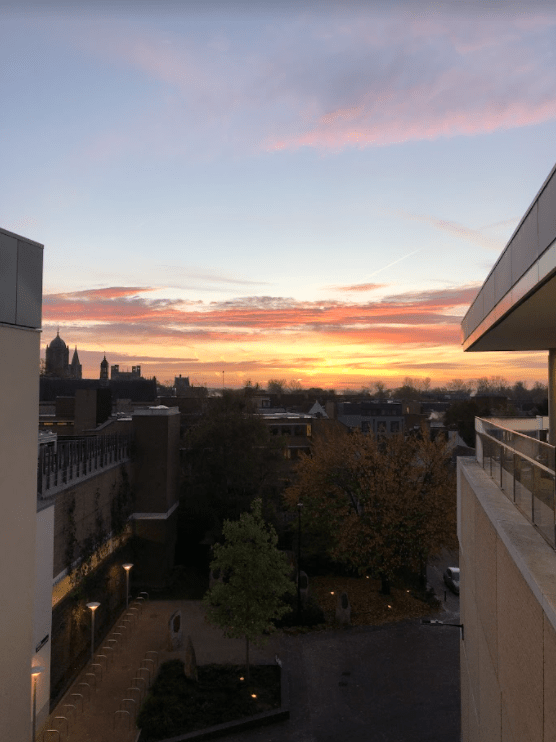On Student Life
Recently, while waiting to go into a class, one of my tutorial partners said, “I love Monday nights in the library, all of the English students are there and it’s one big stressful party as we write (or procrastinate writing) our papers.” Now, that combination of words sounds alien to you, don’t worry, but Oxford does have its own educational lexicon, the most important term in which might be “tutorial” or “tute” for short. The tutorial is a weekly discussion you have with your teacher about the essay or problem sheet you turned in the day before. It’s the center of the Oxford (and Cambridge) educational system and is known for its intensity, but if you really enjoy your subject, it’s also a lot of fun. That said, we also have classes and lectures, which I will explain below.
On Monday morning, I walk about five minutes over to the English Faculty Library which opens at 9 AM (there are no 24-hour libraries at New College: the college library is open from 9 AM to 2 AM, 7 days a week, the faculty library (at least for English and Law) is open from 9 – 5 Monday – Friday, and the University library, the Bodleian (which includes the ever-popular RadCam) is open 9-5, 7 days a week). I might get a coffee at the café upstairs or bring my own and then I will walk upstairs, which is open and airy, something quite rare at Oxford. They have an incredible book collection, much of which is doubled in the university library, an entirely separate collection. I will work on my essay for my Victorian tutorial, which is due Wednesday evening or on my translation for my Tuesday afternoon Old English tutorial, though I will hopefully be done with any classwork I have for my alternate-Monday morning class. More terms! More confusion! I know, and I apologize. A class is something you might have with all of the other students in your subject (English for me) in your college, with one of the tutors, basically the professors. I elected to follow the first-year curriculum pretty closely, so that I could take my tutorials and classes with a larger group, which means that in the fall (Michaelmas term) I am focusing on the Victorians, and cover a couple of novels each week; in the winter (trinity term) I am focusing on the philosophical background of literature, and in the spring (Hilary) I am focusing on the Modernists; I do Old English throughout.
As a visiting student, rather than an actual fresher, I take my Victorian tutorial one-on-one with a very nice (and patient) mphil student who is planning to come to New College as a tutor after he finishes his dissertation. I have quite a bit of freedom, and we meet on Thursday mornings for an hour to discuss my writing that week along with any other reading or ideas he thinks I should be aware of or look into for future essays. I don’t have grades on my essays, though there will be a lot of notes and suggestions. It’s a bit like office hours after you receive an assignment back but combined with a regular class. Another visiting student from Amherst is taking her one-on-one English tutorial with a Shakespearean – a topic which is usually covered with second-year students.
I take my Old English tutorial, which is on Tuesday afternoons, with two matriculated freshers. We bring in and assess our translations. We also talk about critical theory of Old English – I think it’s more like a very small classics course if you happen to have taken one. For my Old English tutorials (and to a much lesser extent my Victorian ones), I attend lectures throughout the week. Currently, these are nearly all virtual. However, I think that they are planning to move back to lecture theaters next fall at the latest. Lectures, moreover, are different from tutorials or classes in that they are for students across the university, so I, as a New College student, would be in a lecture with students from Magdalen, Christ Church, Balliol, St. Catz. However, we are able to choose which lectures we visit each week, though we are expected to talk about them and why we chose them (get ready to be corrected, particularly if your tutor disagrees with some theory of the lecturer’s).
Essay writing, which takes up most of my academic time (25 or so hours/week) is made mostly up of reading research and trying to get a general sense of the author I’m discussing, in addition to whichever specific works I’m writing about. But when Thursday comes along, it’s just about the most fun hour of the week: I basically get to control the discussion and talk about anything that fascinates me, so if you really enjoy your subject (and feel comfortable just going at it with someone who knows a thousand times more than you do), you might find that Oxford is the place for you.
